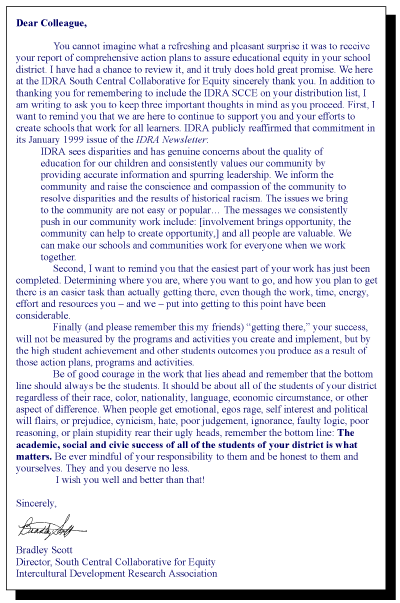• by Bradley Scott, M.A. • IDRA Newsletter • August 2000 • 

I was having a rough day at the office when I got one of those jolts that lifts my spirits and validates the work we do here at the Intercultural Development Research Association (IDRA) South Central Collaborative for Equity (SCCE). The SCCE is the equity assistance center funded by the U.S. Department of Education to serve schools and education agencies in Arkansas, Louisiana, New Mexico, Oklahoma, and Texas in the areas of race, gender, and national origin desegregation.
The jolt was unexpected but most appreciated. I received a copy of a report from a district we had been working with. The report outlined comprehensive action plans to assure educational equity in the district. It showed that the district had taken the work we accomplished together and moved it to a higher level, a level of planned action!
I am not sure what the end will bring. I am not sure to what degree the students will benefit from the changes that are being proposed. I am not sure the action teams who created the plans fully understand what they have committed to. I am not even sure the board of trustees who ordered the development of the report envisioned such comprehensive proposals.
I am sure, however, that if the district carries out what it proposed in the action plan, it will make a difference for the students of the district and the community.
Whatever the outcome of the action plan, I thought I should write a note to the board of trustees of the district, the superintendent, the staff, and the parents and community for what they have created. First, I should give you some background information to give you better insight as to what an accomplishment this action plan is.
Audit Leads to Formation of Community Task Force
In May of 1999, the IDRA SCCE was contacted by the school district to provide technical assistance by conducting an audit of equal educational opportunity. The board and staff wanted to know if they were providing all students with an excellent and equitable opportunity to receive the kind of education necessary to achieve high standards.
During one of its regularly scheduled meetings, the board proposed that the district petition the court to be released from the court’s supervision of its desegregation efforts. To the board’s surprise, African American and Hispanic community members raised serious objections. This segment of the community said that there were still serious educational problems that had not yet been resolved and that might not be resolved if the court was not providing oversight.
The community outcry was a wake-up call for the board that something might be wrong. The board directed that a study be conducted by a 21-member community-based task force to research the matter. The task force had seven Anglo members, seven African American members, and seven Hispanic members. It was balanced by gender and was heterogeneous by job or profession, parent and community type (married, single head of household, etc.), level of education, language, economic level and geographical location in the community. The task force was charged with finding out what is and is not working in the district. Members were to present a set of recommendations for action by December of 1999.
The board directed the superintendent and his staff to provide whatever support would be necessary to conduct the study. The superintendent was also asked to provide the greatest access possible so that the task force’s work would not be interfered with or blocked and so that members would have all of the information they would need to complete their charge.
The superintendent and staff had no decision-making authority about what the task force decided to do or what the final report would reflect. Their role was strictly to support the task force through information dissemination and acquisition and the provision of resources to conduct task force business. The superintendent and staff (including central office personnel, a principal from each campus, the director of community relations, and clerical and secretarial personnel) attended all of the regularly scheduled meetings. Yet, they exercised no voice or authority to conduct business. The community task force members exercised all leadership with guidance and support from IDRA.
During a period of seven months, the 21-member community task force gathered data and information in seven areas of study:
- status of equitable education opportunity;
- work of the desegregation committee (an entity established by the court to monitor and report to the court the district’s desegregation efforts);
- cultural awareness and sensitivity;
- racial discrimination and segregation;
- parental involvement;
- facilities; and
- staffing patterns and perceptions.
The group formed tri-ethnic teams that each assumed leadership in one of these areas by gathering data; by reviewing archival data; conducting community and staff surveys; interviewing staff, parents and community members; conducting focus group discussions; visiting campuses; making school and classroom observations; and conducting any other data and fact-finding procedures that would yield information as a basis for making recommendations.
From an analysis of all of the information that was gathered by the tri-ethnic teams with support from the staff and volunteer citizens from the community, the task force made 25 recommendations for action in the seven areas of study. The task force made its official report to the board during the December 1999 board meeting.
In January of this year, the task force members officially presented their report to the community. Almost 1,000 people were in attendance to hear the report and to make comments to the board.
It was during the community meeting in January that the board of trustees directed the superintendent and his staff to create action teams made up of staff members and community volunteers to create plans for implementing each of the recommendations. Where full implementation was not practical, the teams were directed to explain the reason, and to create a plan for what would be practical and in the fullest spirit of “good faith.”
It was the action report that was the breath of fresh air that I received on that day in the office. Miraculously, the receipt of that package redefined my day. To you, and all of you in districts and communities that are “getting it,” I just wanted to send the note below to say thank you.
Bradley Scott, M.A., is a senior education associate in the IDRA Division of Professional Development and the director of IDRA South Central Collaborative for Equity. Comments and questions may be directed to him via e-mail at feedback@idra.org.
[©2000, IDRA. This article originally appeared in the August 2000 IDRA Newsletter by the Intercultural Development Research Association. Permission to reproduce this article is granted provided the article is reprinted in its entirety and proper credit is given to IDRA and the author.]



